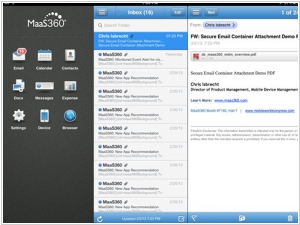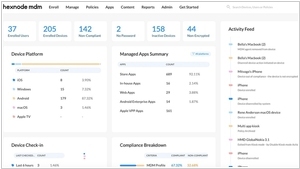Hexnode vs MaaS360
August 28, 2023 | Author: Michael Stromann
12

MDM in Minutes: Deploy, Secure and Support Smartphones & Tablets. Every organization needs to see and control the mobile devices entering their enterprise, whether they are provided by the company or part of a Bring Your Own Device (BYOD) program. MaaS360 mobile device management (MDM) is the fastest, most comprehensive way to make that happen.
Hexnode and MaaS360 are notable solutions in the realm of mobile device management, each with distinct features catering to specific organizational needs. Hexnode offers a comprehensive approach to managing mobile devices, applications, and content across various platforms. It focuses on providing a user-friendly interface and advanced security features, making it an attractive option for organizations seeking efficient management and strong data protection. In contrast, MaaS360, developed by IBM, emphasizes its integration with the broader IBM ecosystem, offering a unified platform for managing devices, applications, and content with a focus on enterprise-grade security. MaaS360's strength lies in its ability to leverage IBM's security expertise and provide a holistic approach to managing and securing mobile devices.
See also: Top 10 MDM software
See also: Top 10 MDM software
Hexnode vs MaaS360 in our news:
2014. IBM and Apple partner for joint Enterprise push

30 years ago, IBM and Apple aspired to dominate the emerging personal computer market but were overshadowed by Microsoft, which monopolized the industry for a significant period. Despite the passage of time, the rivalry persisted. However, a recent development has brought IBM and Apple together in the enterprise mobile market. The evidence can be seen in the photo, depicting Ginny Rometta from IBM and Tim Cook from Apple engaged in discussions, finalizing a collaborative agreement. Under this deal, the companies will jointly enhance IBM MobileFirst, MaaS360, and other IBM business products specifically for iPhones and iPads. They will also market these optimized solutions, along with Apple mobile devices, to IBM's customer base. This strategic move possibly aims to challenge Microsoft as a primary competitor. Consequently, Windows Phone and Surface/Windows 8 may experience a significant decline in their positions within the enterprise sector. However, it is also plausible that Microsoft might once again outmaneuver its rivals. With Satya Nadella as the new CEO, Microsoft has shifted its focus away from platforms and devices, prioritizing cross-platform services instead. Notably, MS Office 365 already functions well on iOS, even better than on Android. Hence, if the share of iOS devices in the enterprise market expands, Microsoft stands to gain increased revenue regardless.




